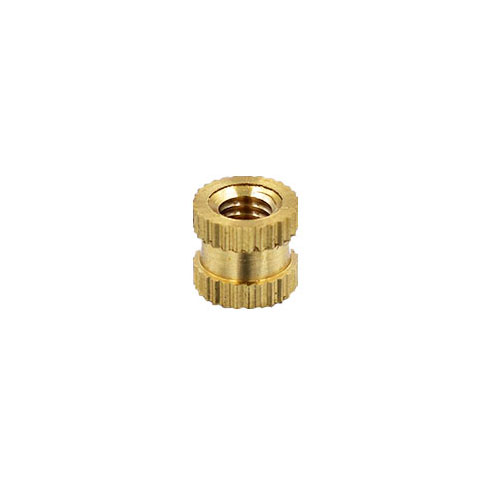Understanding Fastener Nuts: Essential Components in Mechanical Assembly
2025-03-22
Fastener nuts are one of the most commonly used components in the world of mechanical assembly, playing a crucial role in holding various parts together in both simple and complex systems. Whether you're working on construction, automotive, or even household repairs, fastener nuts are integral to ensuring that the parts stay secure and function effectively. In this blog, we’ll dive deep into what fastener nuts are, the different types available, and their various applications in everyday life and industry.
What Are Fastener Nuts?
A fastener nut is a type of hardware used in conjunction with a bolt to fasten or secure multiple components together. Typically made of metal, nuts feature a hole with internal threads that match the threads on a bolt or screw. By twisting the nut onto the bolt, it creates a secure connection that holds the fastened parts in place.
Nuts come in a variety of sizes, materials, and designs, each suited for different types of applications, from light-duty tasks to heavy-duty industrial use. Their primary function is to keep components tightly attached, preventing loosening or shifting under stress, vibration, or external forces.
Types of Fastener Nuts
Fastener nuts come in many different shapes and sizes, each serving a unique purpose depending on the requirements of the job. Below are some of the most common types:
1. Hex Nuts
Hex nuts are one of the most widely used types of nuts, with six sides (hence the name "hex"). They are versatile and can be used in a wide range of applications, from simple repairs to complex industrial machinery. Hex nuts are designed to fit bolts with matching thread sizes and are typically tightened with a wrench.
2. Lock Nuts
Lock nuts are designed to prevent loosening due to vibrations or external forces. They feature a variety of mechanisms, such as nylon inserts, serrated surfaces, or a deformed shape, to create additional friction and resist the nut from unscrewing. Common types of lock nuts include nylon lock nuts and flange lock nuts.
3. Wing Nuts
Wing nuts have two "wings" that make them easy to tighten and loosen by hand. They are commonly used in applications where frequent adjustments or removals are needed, such as securing parts on machinery or in woodworking.
4. Flange Nuts
Flange nuts have a built-in flange (a circular collar) that helps distribute the load more evenly and prevent damage to the surface being fastened. They are particularly useful for applications where the nut needs to be flush against a surface or in situations where it is difficult to use washers.
5. Cap Nuts
Cap nuts are designed to cover the exposed end of a bolt, protecting it from corrosion or wear. They are often used in decorative applications or where aesthetics are important, as they provide a clean, finished appearance.
6. Square Nuts
Square nuts have four sides and are less common than hex nuts. Their primary advantage is that they are less likely to rotate in square holes, making them ideal for use in applications where rotational resistance is important.
7. Coupling Nuts
Coupling nuts are used to connect two threaded rods or bolts together. They are typically longer than regular nuts and have internal threads on both ends, allowing them to join rods or bolts of the same size securely.
Materials Used in Fastener Nuts
The material used to make fastener nuts is just as important as the design. Different materials provide different levels of strength, corrosion resistance, and durability, making it essential to choose the right material based on the environment and application. Some of the most common materials include:
1. Steel
Steel is one of the most commonly used materials for fastener nuts, offering a good balance of strength, durability, and cost. Carbon steel and alloy steel nuts are commonly used in automotive and construction applications.
2. Stainless Steel
Stainless steel is often chosen for its resistance to corrosion and high strength, making it ideal for use in harsh environments, such as marine or chemical industries. It is also used in applications where hygiene is important, such as in food processing.
3. Brass
Brass nuts are corrosion-resistant and provide a more aesthetically pleasing appearance, making them a popular choice in decorative and electrical applications. They are softer than steel and are often used for applications requiring low torque.
4. Aluminum
Aluminum nuts are lightweight, corrosion-resistant, and often used in applications where weight is a concern, such as in aerospace or automotive industries. However, aluminum is not as strong as steel and may not be suitable for high-stress applications.
5. Plastic
Plastic nuts are used in applications where a non-metallic solution is necessary, such as electrical or insulating applications. While they are not as strong as metal nuts, they can offer benefits such as electrical resistance and lighter weight.
How Fastener Nuts Work
The way fastener nuts work is simple but effective. When a nut is placed onto a bolt or screw, the internal threads of the nut mesh with the external threads of the bolt. As the nut is tightened, it pulls the two parts together, creating friction that keeps them securely fastened.
A key element of this mechanism is the "torque" applied when tightening the nut. The proper amount of torque ensures that the connection is tight enough to prevent movement but not so tight that it damages the threads or other components.
In some applications, additional components such as washers or lock washers are used in conjunction with nuts to further distribute the load or prevent loosening.
Applications of Fastener Nuts
Fastener nuts are used across a vast array of industries and applications. Here are some common uses:
1. Construction
Nuts are essential in the construction industry for securing structural components, including beams, frames, and supports. They are commonly used in conjunction with bolts to ensure a secure and stable connection.
2. Automotive
In the automotive industry, nuts are used to secure parts such as wheels, engine components, and chassis elements. They play a critical role in ensuring that all parts remain tightly fastened, even under the intense vibrations of a moving vehicle.
3. Aerospace
Aerospace applications often require high-strength nuts that can withstand extreme temperatures, vibrations, and forces. Specialized materials and locknut designs are often used in the aerospace sector for safety and reliability.
4. Manufacturing
Nuts are integral to machinery assembly in manufacturing, providing secure connections between components such as motors, gears, and conveyors. They are used in both large-scale industrial systems and smaller machines.
5. Home Improvement
On a smaller scale, nuts are frequently used in DIY and home improvement projects. From furniture assembly to securing outdoor fixtures, fastener nuts provide an easy solution for holding various parts together.
Why Are Fastener Nuts Important?
Fastener nuts are essential for the success and longevity of mechanical assemblies. They offer the following benefits:
- Security: By providing a tight, reliable connection, nuts ensure that parts stay in place and do not shift, even under stress.
- Ease of Maintenance: Fastener nuts make it easy to disassemble and reassemble components, facilitating repairs and replacements.
- Versatility: With various types and materials, fastener nuts can be used in almost any application, from simple tasks to highly complex industrial systems.
Conclusion
Fastener nuts are small but incredibly important components that play a crucial role in mechanical assemblies across numerous industries. Whether used in construction, automotive, aerospace, or home improvement, these simple devices ensure that parts stay securely in place, preventing damage, wear, and failure. With their variety of types and materials, fastener nuts offer versatility and reliability in countless applications. Understanding the different types of nuts and how they function is essential for ensuring the success and safety of any project.



